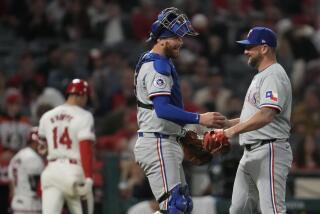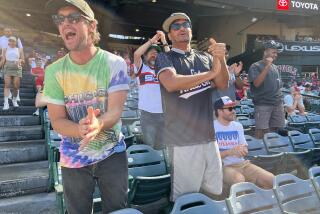A look back at Angels’ great World Series comeback against Giants
Almost 10 years ago, the Angels achieved one of the greatest comebacks in baseball history when they defeated the San Francisco Giants in Game 6 of the World Series.
Call it memorable. Call it remarkable. But if you’re talking to Tim Salmon, just don’t call it shocking.
“We were a late-inning comeback team,” said Salmon, who was an outfielder with the Angels for 14 seasons and is now a Fox Sports West analyst. “It was just one more example of us never being out of the game. There’s no doubt that within that game, the momentum, it didn’t necessarily surprise you at the end when it happened. That was the team’s character the whole second half of the season, really.”
When the Giants arrive at Angel Stadium on Monday, it will be their first trip to Anaheim since that 2002 World Series, which the Angels won in seven games. Although Angels Manager Mike Scioscia is the only active member of those clubs still with the Angels or Giants, the memories persist.
For a squad that stumbled out of the gate to a 6-14 start, the rest of the ride was “magical.”
“I can’t believe it’s been 10 years,” Salmon said. “It’s one of those things where we came together and it was so special. It’s kind of like what St. Louis did last year.”
The Angels took off after a slow April, going 93-49 the rest of the way and earning a wild-card playoff berth. After finishing off the New York Yankees in four games and the Minnesota Twins in five, the Angels found themselves up against the wall in Game 6 against San Francisco.
With the Giants holding a 3-2 series advantage and a 5-0 lead with only eight outs to go, the situation looked bleak for the Angels, although no one told them.
“You’re so caught up in the moment you’re just thinking about giving yourself a chance to get back into the game,” said Garret Anderson, like Salmon an outfielder on the 2002 team and now an FS West analyst. “We started chipping away at the lead. From a player’s point of view, we didn’t understand what was going on other than trying to get back into the game.”
Giants starter Russ Ortiz got Anderson to ground out to start the seventh. Then, after Troy Glaus and Brad Fullmer singled in consecutive at-bats, Giants manager Dusty Baker made what would prove to be a fateful and controversial decision, removing Ortiz. Baker even handed the ball to Ortiz as he left, almost as if anticipating that it would become a keepsake — the game ball thrown by the winning pitcher in the victory that clinched the Giants’ first World Series championship since the club moved to the West Coast from New York in 1958.
The Angels had other ideas. Scott Spiezio greeted reliever Felix Rodriguez with a fly ball that barely cleared the right-field fence at Edison Field (as Angel Stadium was then known), a three-run home run that narrowed the deficit to 5-3.
The Angels completed the comeback in the bottom of the eighth, starting with Darin Erstad’s home run against Tim Worrell to make it 5-4. Salmon and Anderson singled, and Baker summoned his closer, Robb Nen. Then the six-run comeback finished where it had begun, as Glaus doubled home pinch-runner Chone Figgins and Anderson to put the Angels on top for good.
They cruised to a 4-1 win in Game 7 the next evening.
“They were relentless,” Scioscia said. “They just went after it hard; they were a very talented group that was underrated from the ballplayers there were at the time. These guys played with passion and it was a fun group to be around.
“You’re not going to see many comebacks from a team with its back against the wall better than what we had in Game 6.”
The 2002 Angels did not have the Yankees’ resume or a baseball legend like the Giants’ Barry Bonds, but they had the grit of a champion. Not to mention noise sticks and the Rally Monkey.
“That team was such a blue-collar team,” Salmon said. “It was one game at a time, one day at a time, one pitch at a time. Our focus was zeroed down to each and every moment of the game and what everybody had to do. I don’t think there was a lot of thinking outside of that of what people were thinking.
“It was really about taking care of their own business and the 25 guys doing their job whenever they were called to do it.”
Salmon credits Scioscia, now the longest-tenured manager in the game in his 13th season at the helm, with building the winning foundation that has been maintained in Anaheim during an era of widespread player movement and managerial instability.
“The cohesion between the coaches and the players and everyone keeping the attitude right and the mood right,” he said. “Scioscia does such a great job of keeping guys focused on what needs to be focused on day in and day out. He worries about the big picture and lets you worry about what you have to take care of right then.”
More to Read
Go beyond the scoreboard
Get the latest on L.A.'s teams in the daily Sports Report newsletter.
You may occasionally receive promotional content from the Los Angeles Times.










